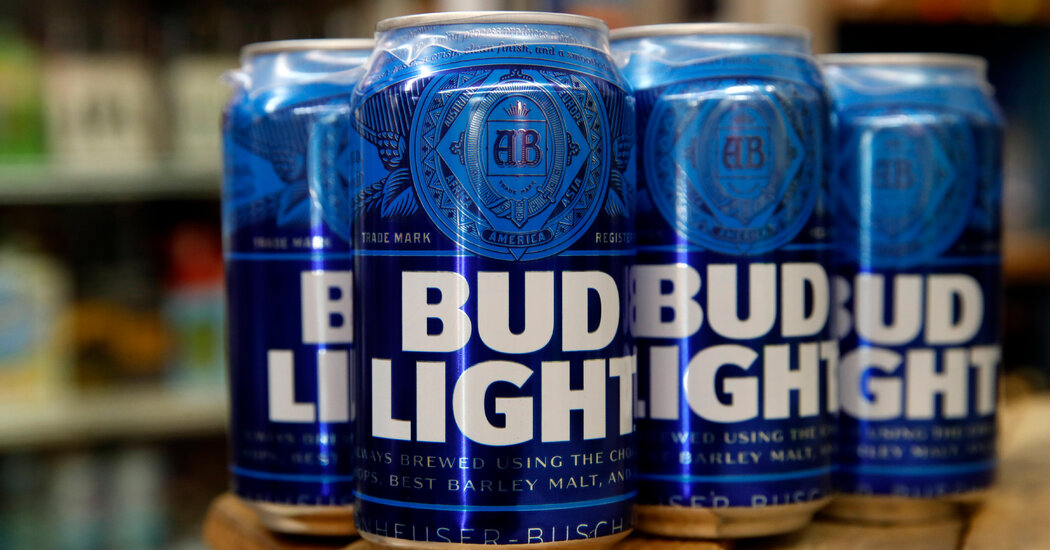Bud Light maker Anheuser-Busch said on Tuesday that two of its executives were on leave after the beer was promoted on social media by a transgender influencer.
Bud Light’s sales have fallen amid calls for a boycott over the ad and criticism of the company’s response to the backlash, including targeted harassment of one of its executives who is on leave.
Alissa Heinerscheid, the vice president of marketing for Bud Light, and Daniel Blake, who oversees marketing for Anheuser-Busch’s mainstream brands, were on leave, the company said in a statement.
“We’ve made some adjustments to streamline our marketing function structure to reduce layers so that our most senior marketers are more closely connected to every aspect of our brands’ operations,” Anheuser-Busch said in a statement. “These steps will help us continue to focus on what we do best: brewing great beer for all consumers, while always making a positive impact in our communities and our country.”
The turmoil surrounding the company began on April 1, when a transgender influencer, Dylan Mulvaney, posted a video to her Instagram account promoting a Bud Light March Madness contest to her 1.8 million followers. In her message, which lasted less than a minute, she said the company sent her a large can of Bud Light with her face on it. An image of the can is mounted in the video.
Within days, conservative celebrities and politicians called for a boycott of the brand. These calls were then followed by calls for a reverse boycott or buycott, encouraging people to buy Bud Light to show support for the marketing.
Brendan Whitworth, the CEO of Anheuser-Busch InBev, spoke indirectly about the controversy in a statement on April 14.
“It was never our intention to be part of a discussion that divides people,” he said. “It is our job to bring people together over a beer.”
This failed to quell Bud Light’s criticism, which grew into complaints about the lukewarm response to the backlash, as well as the targeted harassment of Ms. Heinerscheid.
Critics of the ad featuring Ms. Mulvaney had found a March podcast interview in which Ms. Heinerscheid said some of Bud Light’s past ads contained “fratty, kind of out-of-touch humour” and that the company should be more inclusive to the demographic to grow. As the podcast quotes circulated, The Daily Caller, The New York Post and The Daily Mail published photos of Ms. Heinerscheid at a college party in 2006.
Ms. Heinerscheid and Mr. Blake were not immediately available for comment.
News of the executives’ departure began circulating after a report about Ms. Heinerscheid on Friday in Beer Business Daily, a trade publication, and a report about her superior, Mr. Blake, on Sunday in The Wall Street Journal.
The controversy has had a negative effect on Bud Light sales, which fell 17 percent in the week ending April 15, according to Beer Business Daily.
In the United States, the beer industry is dominated by two major brewers that control 65 percent of beer sales: the Molson Coors Beverage Company, owner of well-known brands such as Coors and Miller, and Anheuser-Busch InBev, which also owns Corona and Michelob.
Just over 20 years ago, beer accounted for about half of the country’s alcohol sales. Last year that market share was about 42 percent, because sales of gin, vodka and other spirits have grown strongly in recent years.
Anheuser-Busch, which has introduced nonalcoholic and canned cocktail drinks, reported that its beer sales in North America fell 4 percent last year.
Bump Williams, who runs an alcoholic beverage consulting firm, said he was becoming concerned that the Bud Light controversy could lead to a negative “halo effect” around Anheuser-Busch’s other brands, many of which experienced minor declines. know in sales.
Harry Schumacher, the publisher of Beer Business Daily, said that as Bud Light sales fell, they rose almost dollar for dollar for its competitors Miller Lite and Coors Light.
Mr. Schuhmacher said the situation was “terrible” for Bud Light in the short term, but would likely have less impact on the company’s long-term business because the brand was already in decline. “This only reinforces the curve of decline that was already underway,” he said.
He said that the popularity of different beer brands varies by generation and that Bud Light is going through the slump in that cycle.
“It’s been going on since Prohibition was repealed,” he said. “And brands go through about every 20 to 30 years.”
He said there could be a “silver lining” for the company as the controversy has attracted so much media attention.
“They seemed to take a position, although they didn’t really support it very well,” said Mr. Schuhmacher. “They threw it out there and hid it, which I think is unfair to Dylan and a little bit unfair to the trans community.”
Criticism of Bud Light arose when Republican state legislators proposed legislation that aims to regulate the lives of young transgender people, restrict drag shows in a way that could broadly encompass transgender performances, and require schools to turn transgender students over to their parents.
Ms. Mulvaney documents her transition on TikTok, where she has more than 10.8 million followers. In March, she celebrated a year of her “Days of Girlhood” series.
Anheuser-Busch said earlier this month that it “works with hundreds of influencers from our brands as one of many ways to authentically connect with audiences from a variety of demographics” and gave Ms. Mulvaney a personalized can with her face on it to ” a personal milestone.”
Ms. Mulvaney has not commented on the Bud Light stir, but she spoke about the animosity she faced in an interview on the “Onward With Rosie O’Donnell” podcast, which was released amid the backlash. She’s “an easy target,” she said, “because I’m still new to this.”

